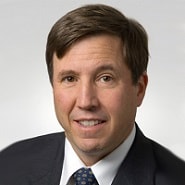
Andrew Pecora, MD, Hematologist/Oncologist, Hackensack Meridian Health
“Ideas can come from anywhere.”
It’s a phrase uttered by many leaders, but oftentimes it’s just that: lip service. There are no tangible processes in place to enable anyone – from an environmental services worker to the CNIO – to present an innovation solution.
At Hackensack Meridian Health, however, innovation has been part of the organization’s DNA since 2017, when the Bear’s Den program was launched. According to Andrew Pecora, MD, who has played a key role both in creating and advancing the initiative, it was designed as an incubator for ideas to improve care delivery and patient satisfaction.
The program has already supported two innovations — Pillo, a robotic home health device, and PurpleSun, a technology that uses a 90-second disinfection cycle to help prevent hospital-acquired infections. And that’s only the beginning, says Pecora.
“We have 34,000 team members who take care of our patients. Among them, there are hundreds of great ideas. This helps us to capture them.”
Through the initiative, employees are encouraged to present their solutions at the Ideation Center, where they will either receive feedback on how to improve it, or be given the green light to bring it the Bear’s Den. At that point, a panel of experts, including physicians, venture capitalists, patent attorneys, and key network executives, will vet the proposal and discuss next steps.
Some of the most promising concepts have focused on streamlining care delivery, reducing infections, lowering hospital readmissions, and helping patients more effectively partner with care providers. “Through this process, we have 34,000 potential inventors working for us,” noted Pecora, who worked with senior leadership to create Bear’s Den hubs in each of Hackensack Meridian’s 17 hospitals.
Innovation has always been a priority for Pecora, who led development of the John Theurer Cancer Center and played a key role in the success of several partnerships, including those with Memorial Sloan Kettering Cancer Center and Georgetown Lombardi Cancer Center. Although he recently stepped down from the role of chief innovation officer with Hackensack Meridian, he remains involved as a consultant and strategic advisor, and will continue to engage with physician leaders to drive transformation.
Pecora has always believed that the best source for insights on how to improve processes and care often come from those on the front line. The challenge for many organizations has been vetting and operationalizing those ideas. The best way to start, he notes, is with four simple questions:
- Does it address a problem?
- Is there a market for this particular solution?
- Do those who are pitching the idea have the right skill sets?
- Are there outside investors?
“If those four boxes are checked, we’re in,” he says. “But if anything is missing, we don’t say ‘no’ — we offer guidance on what they need to do, and how they can do that.”
And although some ideas skate right through — most notably PurpleSun, which the Wall Street Journal dubbed “a game-changer in health technology,” most need to go through a few rounds before getting a piece of the $25 million investment fund. What that means, Pecora says, is that potential inventors must be ready to defend the idea, and willing to accept constructive criticism.
As for the panel — or “sharks” as he called them, referring to the popular show Shark Tank—they have to follow a few rules as well.
First, remember that everyone in the organization matters, and there’s no hierarchy when it comes to presenting ideas. “You have to have zero bias regarding where ideas come from,” he says. “As an example, the best finance ideas don’t necessarily have to come from the finance department.”
Second, “You can’t be afraid to fail. Innovation is filled with failures,” says Pecora, adding that even Albert Einstein was wrong more times than he was right, “but when he was right, his thoughts changed the way we view the world.”
Finally, remember that no one bats a thousand. Someone who has presented a fantastic idea may come back with a dud, and vice versa. The most important thing is for leaders to cultivate a culture in which anyone is welcome to contribute, and ideas will sink or swim based solely on their merit.
“If you have that culture, you’ll invite innovation.”
It’s precisely what Pecora has been able to do. In his new role as CEO of Outcomes Matter Innovations, an organization created to enable partnership between private physicians and health care networks, he’ll continue to focus on bringing ideas forward – regardless of where they originated.
healthsystemCIO’s Interviews and Podcasts are sponsored by:



Share Your Thoughts
You must be logged in to post a comment.